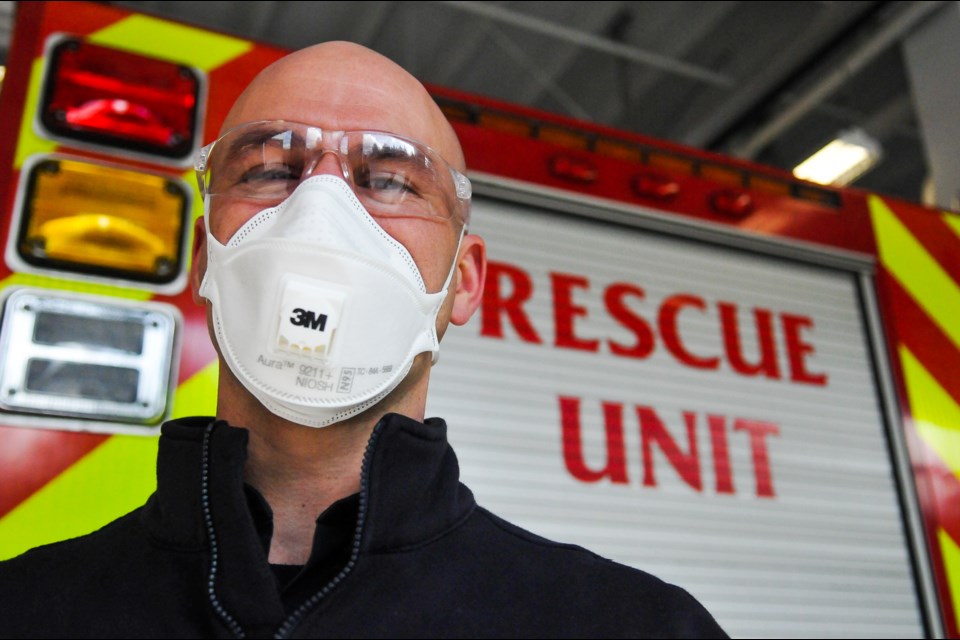How have you been affected by the coronavirus outbreak? We want to hear your questions, stories and concerns. Here's how you can get in touch?
Amidst the growing pandemic, a trip to your local fire and police station has been put on hold as stringent measures are put in place to keep first responders at the ready.
So when The Tri-City News arrived at Port Moody’s Fire Hall #1 on Ioco Road, the conversation began with elbow bumps and continued at a prudent two-metre-and-then-some distance.
Both Port Moody’s fire chief, Ron Coulson, and its police chief, Dave Fleugel, were on hand to explain where the city’s emergency services are in preparation for any local surge in the COVID-19 caseload.
Normally, when someone calls 911 because of a health problem, BC Ambulance operators will triage the call. But now, there’s a list of extra screening in place that starts with the call-taker and continues through when a fire crew is sent to respond.
“If it's anything related to flu-like symptoms right now, or any unknown, or lack of detail on the call, then we're going to immediately go on a bit of a heightened alert,” said Chief Ron Coulson.
Port Moody firefighters have two kinds of personal protective equipment (PPE): Level one, which is worn on most medical calls, involves unsealed eye protection and an N95 mask.
“We’ll don that no matter the call. And then we'll go through a bit of an updated and enhanced screening process on scene now,” said Coulson.
Upon arrival, firefighters will approach an injured person using a two-metre triage protocol; that means sending in a single firefighter to make contact with the injured person and immediately putting a mask on them. That firefighter then will ask a battery of questions to find out if the subject has had any flu-like symptoms, whether they have a travel history outside of the country and whether they have had any known exposure to anyone infected with the novel coronavirus.
If any of those questions come back positive or the person is unconscious, the firefighter will suit up into what Port Moody Fire and Rescue call Level 2 PPE: an impervious surgical gown that blocks any vapour, blood or vomit from splashing on to the first responder as well as a face shield similar to those healthcare workers use at hospitals.
“We used to get this quite a bit with blood-borne pathogens. We would get a notification somebody who was Hep-C positive or HIV positive,” he said. “But this is way different.”
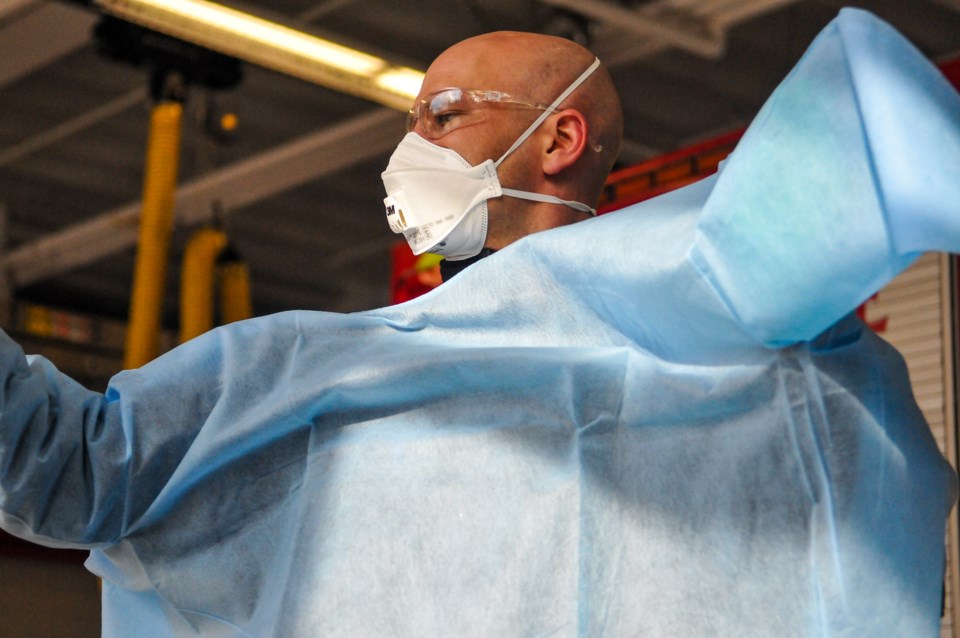
SUPPLY SUPPLIES
Like many first responders and frontline health care workers, getting their hands on a steady supply of PPE presents an additional challenge.
“They’re in short supply — worldwide. Can’t find them right now,” Coulson said.
Responding to a fire call is less complicated as firefighters already go in with a self-contained breathing apparatus that seals around their face. Other fire departments have shifted to making this the standard gear on a medical call. While Coulson said Port Moody Fire and Rescue is not there yet, he added: “anything is on the table.”
“It literally is such a dynamic and fluid environment that we're learning every day,” he told The Tri-City News.
The department is still fully staffed and no firefighter is in self-isolation. But should anyone go down due to the virus, Coulson said it would affect the department immediately. If that starts happening, the department has plans to drop what it calls “low-acuity calls” and let ambulance or another fire department handle it.
“But there's a risk in that… there could be an individual that's in dire need of assistance,” said Coulson, pointing to a potentially devastating situation of a senior living alone without family available to help.
Neighbouring fire departments would also be in a position to help on calls should the department be decimated by the virus, something that’s already done for major fires, like when Coquitlam Fire and Rescue sent three trucks to help snuff out last year’s Clarke Street fire.
“The problem with the mutual aid program in the fire service is that it's based on availability. So if Coquitlam has been decimated and New Westminster has been decimated, and Burnaby is busy, I pick up the phone, the answer might be ‘no,’” Coulson said. “That’s a real concern for us.”
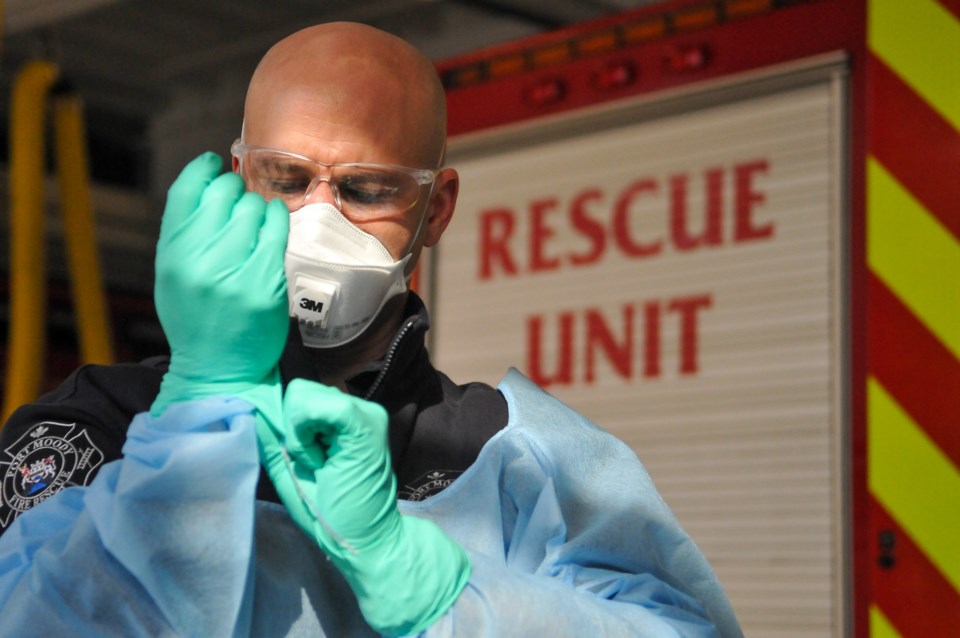
A HARD CALCULATION
For the Port Moody Police Department, new measures to assess risk of exposure to COVID-19 start at regional dispatch, where operators are now asking callers probing questions about potential infection or travel history.
When police officers are out on a call, they’ve also taken the unusual step of waiting in their car and making telephone contact initially instead of going to the door — although that only applies to non-emergency incidents that don’t require an officer to, say, physically separate two people in the midst of an assault.
Each officer carries their own personal protective equipment, including N95 masks and another “max-level” mask, designed for chemical, biological and radiological response and which are often donned by police when responding to a burning meth lab.
But Chief Constable Fleugel said in a potentially violent situation where the mask obstructs an officer’s peripheral vision, officer safety trumps the possible transmission of COVID-19.
“Our officer has to make that decision. I would rather have them keep their firearm and get sick potentially with COVID-19 than actually be hurt by their own sidearm,” he said. “It’s a pretty hard calculation.”
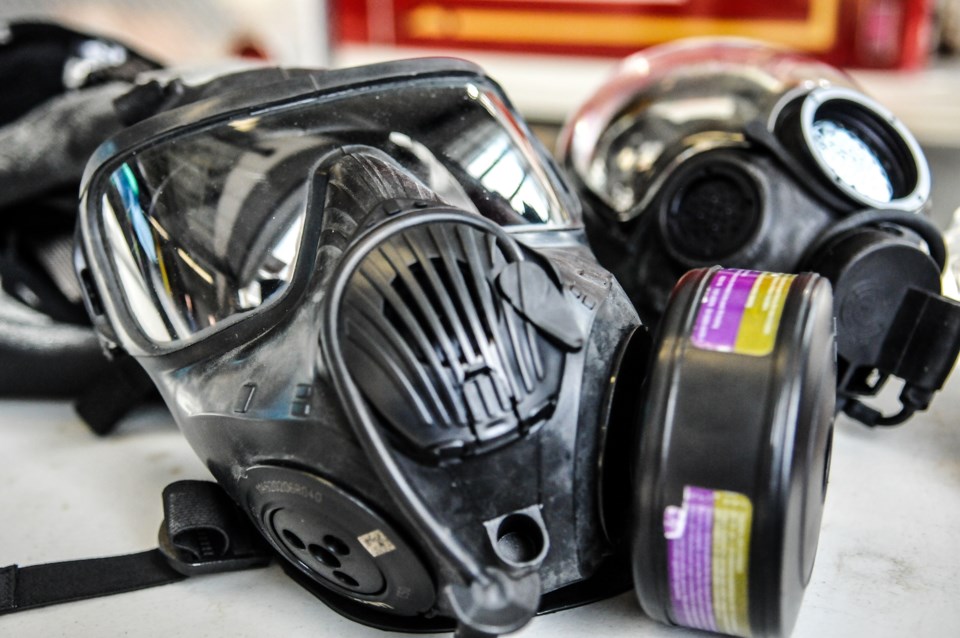
When it comes to losing staff due to infection by the novel coronavirus, the chief said the department has set up a backup shift in case a whole squad gets infected and loses operational capability. But, he said, the new staffing model is temporary and the department doesn’t have the resources to sustain it indefinitely.
So far, Port Moody Police Department is down two officers and one civilian employee due to self-imposed quarantine after travelling to the U.S. — out of an “abundance of caution.”
If staffing takes significant hits as the outbreak grows, the PMPD, like firefighters, will first stop attending low-priority calls. At that point, Fleugel said, the department’s “no-call-too-small” mantra will be dropped. And he urged Port Moody residents not to expect quick responses to such reports as patio furniture theft.
“It's status normal right now,” he said. “But our contingency planning tells us that as this thing peaks, we potentially could lose a percentage of our workforce, [and] we need to have the ability” to make changes," he said.
If even more officers are forced off-duty because of exposure to the virus, PMPD is working on a mutual aid agreement with other Lower Mainland police forces.
“But to be totally frank with you, we do not have a plan. We have not built a model for that. It would probably be something that we would see coming, you know, as we lose staff,” said the chief. “It would be kind of what we call ‘down and dirty.’ It would be very rough.”
B.C. police forces share a common digital repository for police files and that makes it easier for squads from one department to support another. “It’s plug and play. We can take over in Coquitlam and Coquitlam can come and help us,” said Fleugel.
But mutual aid agreements between departments have been modelled and tested with single events in mind — like the Stanley Cup riots in 1994 and 2011, and when an officer was shot to death in Abbotsford in 2017 — or in catastrophic events such as an earthquake.
“This is a very different beast,” Fleugel said.
In the meantime, both Port Moody fire and police services have locked down their facilities and ramped up preventative measures like social distancing and hand hygiene.
As Chief Const. Fleugel put it, “[We are] professions that protect public safety… We can’t afford to be sick.”
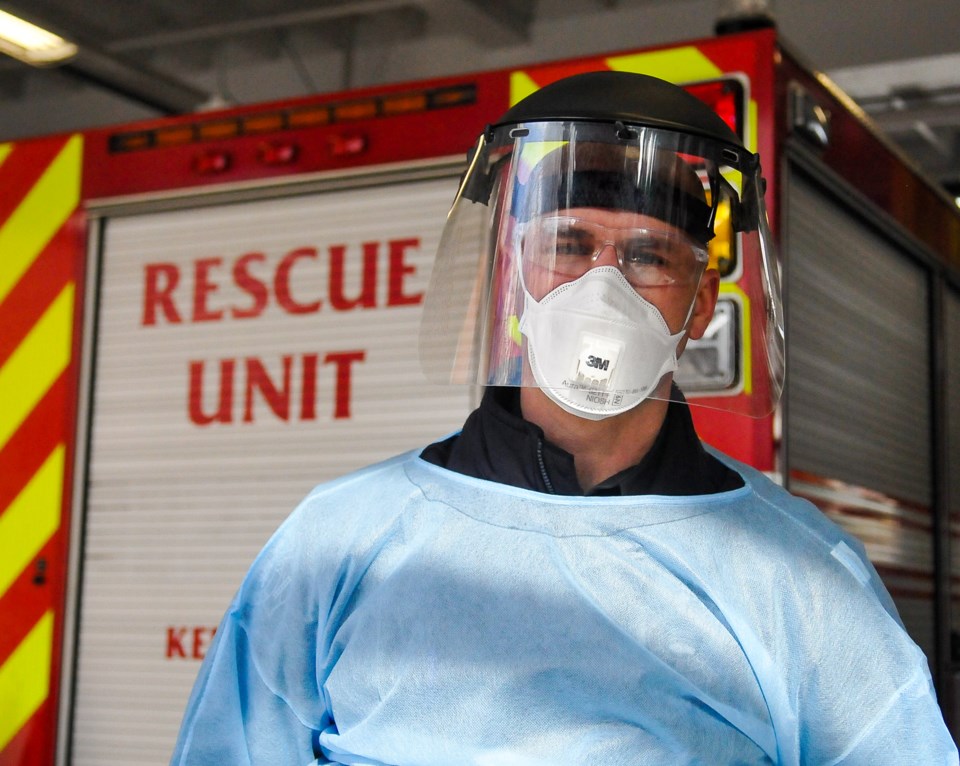
Read more of our COVID-19 coverage here.
